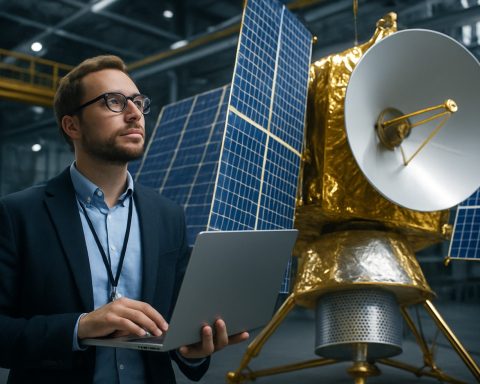100 Trailblazing Space Startups Redefining the New Space Economy Worldwide
- Mapping the Evolving Space Startup Market
- Emerging Technologies Driving Space Innovation
- Key Players and Competitive Dynamics in the Space Startup Ecosystem
- Projected Growth and Investment Trends in Space Startups
- Regional Hotspots and Global Distribution of Space Startups
- What Lies Ahead for the Space Startup Sector
- Navigating Challenges and Unlocking Opportunities in the New Space Economy
- Sources & References
“Amazon has successfully launched its second batch of Project Kuiper satellites, advancing its plan to provide global satellite internet and directly compete with SpaceX’s Starlink.” (source)
Mapping the Evolving Space Startup Market
The global space industry is undergoing a dramatic transformation, driven by a new generation of agile, innovative startups. These companies are redefining the boundaries of the “New Space” economy, which is projected to reach a value of over $1 trillion by 2040 according to Morgan Stanley. The landscape is no longer dominated solely by government agencies and legacy aerospace giants; instead, more than 100 space startups worldwide are now at the forefront of technological advancement, commercialization, and democratization of access to space.
These startups span a wide array of sectors, including satellite manufacturing, launch services, Earth observation, in-orbit servicing, space tourism, and resource mining. For example, SpaceX and Rocket Lab have revolutionized launch costs and frequency, while Planet Labs and Satellogic are leading in high-resolution Earth imaging. In the realm of in-orbit services, Astroscale is pioneering debris removal, and Momentus is developing in-space transportation solutions.
According to Seraphim Space Tech Index, investment in space startups reached a record $12.5 billion in 2021, with over 1,700 companies globally now active in the sector. The United States remains the leader, but Europe, Asia, and emerging markets are rapidly catching up. Notable European startups include Isar Aerospace (Germany) and ICEYE (Finland), while Asia boasts innovators like iSpace (China) and Skyroot Aerospace (India).
These 100+ startups are not only driving down costs and increasing access to space, but also enabling new business models and applications—from global broadband internet (e.g., OneWeb) to climate monitoring and even lunar exploration (Intuitive Machines). As the space startup ecosystem matures, it is expected to play a pivotal role in shaping the future of the global space economy, fostering innovation, and creating new opportunities for industries and societies worldwide.
Emerging Technologies Driving Space Innovation
The global space industry is undergoing a profound transformation, driven by a new wave of innovative startups that are redefining the boundaries of what is possible beyond Earth. These emerging companies are leveraging cutting-edge technologies—such as reusable rockets, small satellites, artificial intelligence, and in-orbit manufacturing—to create new markets and disrupt traditional aerospace paradigms. According to Space Capital, private investment in space infrastructure reached $6.5 billion in Q1 2024 alone, underscoring the sector’s rapid growth and investor confidence.
Among the hundreds of space startups worldwide, a select group of 100 companies are particularly influential in shaping the new space economy. These startups span a diverse range of activities, including launch services, satellite communications, Earth observation, space tourism, and resource extraction. Notable examples include:
- SpaceX (USA): Pioneering reusable launch vehicles and Starlink satellite internet.
- Planet Labs (USA): Operating the world’s largest fleet of Earth-imaging satellites.
- ispace (Japan): Developing lunar landers for commercial and scientific missions.
- ICEYE (Finland): Specializing in synthetic aperture radar (SAR) microsatellites for real-time Earth monitoring.
- Astroscale (Japan): Focused on space debris removal and sustainable orbital operations.
- GHGSat (Canada): Monitoring greenhouse gas emissions from space.
- Relativity Space (USA): Using 3D printing to manufacture rockets with unprecedented speed and flexibility.
- Satellogic (Argentina): Providing high-resolution, affordable Earth observation data.
- OneWeb (UK): Deploying a global satellite constellation for broadband connectivity.
- Axiom Space (USA): Building the world’s first commercial space station.
These startups are not only advancing technology but also democratizing access to space, enabling new business models, and fostering international collaboration. As highlighted by Morgan Stanley, the space economy could grow to over $1 trillion by 2040, with startups playing a pivotal role in this expansion. Their innovations are expected to drive down costs, increase accessibility, and unlock new applications—from climate monitoring to interplanetary exploration—cementing their status as key architects of the future space economy.
Key Players and Competitive Dynamics in the Space Startup Ecosystem
The global space startup ecosystem has experienced explosive growth over the past decade, with more than 10,000 space-related companies now operating worldwide (Space Capital). Among these, a select group of 100 startups are at the forefront, driving innovation and shaping the new space economy through advancements in launch services, satellite technology, Earth observation, in-orbit servicing, and space resource utilization.
- Launch Services: Companies like SpaceX (USA), Rocket Lab (New Zealand/USA), and ispace (Japan) are revolutionizing access to space with reusable rockets and cost-effective launch solutions.
- Satellite Constellations: Startups such as Planet Labs (USA), OneWeb (UK), and Starlink (USA) are deploying large constellations for global broadband and Earth imaging.
- Earth Observation & Analytics: Satellogic (Argentina), ICEYE (Finland), and Capella Space (USA) are leveraging advanced sensors and AI to deliver real-time geospatial intelligence.
- In-Orbit Services: Astroscale (Japan) and Northrop Grumman’s MEV (USA) are pioneering satellite servicing, debris removal, and life extension missions.
- Space Resources & Manufacturing: Made In Space (USA) and Lunar Outpost (USA) are developing technologies for in-space manufacturing and lunar resource extraction.
These startups are backed by record levels of private investment, with $6.5 billion invested in space infrastructure in 2023 alone (Space Capital Q1 2024). The competitive landscape is marked by rapid technological iteration, cross-border partnerships, and increasing government collaboration, as agencies like NASA and ESA turn to startups for commercial services (NASA Commercial Space). As the sector matures, these 100 startups are not only shaping the future of space but also redefining the boundaries of the global economy.
Projected Growth and Investment Trends in Space Startups
The global space economy is undergoing a transformative phase, with private investment and technological innovation driving unprecedented growth. As of 2023, the space industry was valued at approximately $546 billion, with projections suggesting it could surpass $1 trillion by 2030 (Morgan Stanley). Central to this expansion are space startups, which are pioneering advancements in satellite technology, launch services, Earth observation, in-orbit servicing, and space resource utilization.
According to SpaceNews, venture capital investment in space startups reached a record $47.9 billion in 2021, and while 2022 and 2023 saw a slight correction due to broader economic headwinds, the sector remains robust. Notably, over 100 space startups worldwide are at the forefront of shaping the new space economy, spanning regions from North America and Europe to Asia and Africa.
- Satellite Constellations: Companies like Starlink (SpaceX), OneWeb, and Planet Labs are deploying large constellations for global broadband and Earth imaging, addressing connectivity and data needs.
- Launch Services: Startups such as Rocket Lab, Relativity Space, and ispace are innovating with reusable rockets, 3D printing, and lunar missions, reducing costs and increasing launch frequency.
- In-Orbit Services: Companies like Astroscale and Northrop Grumman are developing technologies for satellite servicing, debris removal, and life extension, crucial for sustainable space operations.
- Space Resource Utilization: Startups such as Lunargistics and OffWorld are exploring asteroid mining and lunar resource extraction, laying the groundwork for future off-Earth economies.
- Emerging Markets: Regions like India and Africa are seeing a surge in space startups, including Pixxel (India) and Satellogic (Argentina), expanding the global reach of the new space economy.
With governments and private investors increasingly recognizing the strategic and commercial potential of space, the next decade is set to witness accelerated growth, diversification, and democratization of space access. The 100+ space startups leading this charge are not only shaping the industry’s future but also redefining humanity’s relationship with space (Space Capital).
Regional Hotspots and Global Distribution of Space Startups
The global landscape of space startups has rapidly diversified, with over 100 innovative companies now driving the new space economy across multiple continents. These startups are not only redefining satellite technology and launch services but also expanding into areas such as in-orbit servicing, space resource utilization, and data analytics. The distribution of these companies highlights several regional hotspots, each contributing unique strengths to the sector.
- North America: The United States remains the epicenter of space startup activity, home to more than half of the world’s leading space startups. Companies like SpaceX, Planet Labs, and Rocket Lab (with operations in both the US and New Zealand) are pioneering reusable launch vehicles, Earth observation, and small satellite deployment. According to Seraphim Space Tech Index, the US attracted over $4.5 billion in space startup investment in 2023.
- Europe: Europe’s space startup ecosystem is rapidly maturing, with hubs in Germany, France, and the UK. Notable players include Isar Aerospace (Germany), ICEYE (Finland), and OneWeb (UK). The European Space Agency’s Business Incubation Centres have supported over 1,200 startups since inception.
- Asia-Pacific: The Asia-Pacific region is emerging as a significant force, led by India, China, and Japan. India’s Skyroot Aerospace and Agnikul Cosmos are developing indigenous launch capabilities, while China’s LandSpace and iSpace are advancing commercial launch services. Japan’s ispace is a leader in lunar exploration.
- Other Regions: Australia, Israel, and the Middle East are also nurturing promising startups. Australia’s Gilmour Space Technologies and Israel’s SpaceIL are notable for their launch and lunar missions, respectively.
These 100+ startups are collectively shaping the future of the space economy, with global investment in space startups reaching $8.9 billion in 2023 (SpaceNews). Their regional distribution reflects both local innovation ecosystems and the increasing internationalization of the space sector.
What Lies Ahead for the Space Startup Sector
The global space startup sector is experiencing unprecedented growth, with over 100 innovative companies at the forefront of shaping the new space economy. These startups are not only redefining traditional space activities such as satellite deployment and launch services but are also pioneering new markets in Earth observation, in-orbit servicing, space tourism, and resource extraction.
According to Space Capital’s Q1 2024 Investment Review, private investment in space infrastructure reached $4.5 billion in the first quarter of 2024 alone, signaling robust investor confidence. The number of active space startups has surged, with the Seraphim Space Index tracking more than 1,700 space tech companies globally, of which at least 100 are recognized as key players driving sectoral transformation.
- Satellite Constellations: Companies like Starlink (SpaceX), OneWeb, and Planet Labs are deploying large constellations for global broadband and Earth imaging, reducing costs and increasing accessibility.
- Launch Services: Startups such as Rocket Lab, Relativity Space, and ispace are innovating with reusable rockets and 3D-printed components, making launches more frequent and affordable.
- In-Orbit Services: Companies like Astroscale and Northrop Grumman’s MEV are developing technologies for satellite servicing, debris removal, and life extension, addressing sustainability in space.
- Space Tourism and Habitats: Blue Origin, Virgin Galactic, and Axiom Space are opening new frontiers for commercial human spaceflight and private space stations.
- Resource Utilization: Startups such as Lunargistics and TransAstra are exploring lunar and asteroid mining, aiming to unlock new sources of materials for both space and terrestrial industries.
As these 100+ startups continue to attract capital and talent, the space economy is projected to surpass $1 trillion by 2040 (Morgan Stanley). Their innovations are not only expanding humanity’s reach beyond Earth but also creating new commercial opportunities and addressing global challenges through space-based solutions.
Navigating Challenges and Unlocking Opportunities in the New Space Economy
The new space economy is rapidly evolving, driven by a surge of innovative startups that are redefining how humanity interacts with space. As of 2024, over 100 space startups worldwide are at the forefront of this transformation, tackling challenges from satellite deployment to in-orbit servicing, space tourism, and resource extraction. These companies are not only expanding the commercial potential of space but also addressing critical issues such as sustainability, cost reduction, and accessibility.
- Satellite Technology and Launch Services: Startups like Planet Labs and Spire Global are revolutionizing Earth observation with constellations of small satellites, providing real-time data for agriculture, climate monitoring, and logistics. Meanwhile, Rocket Lab and Relativity Space are lowering launch costs through reusable rockets and 3D-printed components.
- In-Orbit Services and Debris Removal: Companies such as Astroscale and ClearSpace are addressing the growing problem of space debris, developing technologies for satellite servicing and end-of-life removal, which are crucial for sustainable space operations.
- Space Tourism and Habitats: Blue Origin and Virgin Galactic are pioneering commercial spaceflight, making suborbital travel accessible to private citizens. Startups like Orbital Assembly are working on space habitats, aiming to support long-term human presence in orbit.
- Resource Utilization and Lunar Missions: ispace and Astrobotic are leading lunar exploration and resource extraction, with missions targeting the Moon’s surface for mining and infrastructure development.
According to Space Capital, private investment in space startups reached $8.2 billion in 2023, reflecting strong confidence in the sector’s growth. The proliferation of these startups is unlocking new opportunities, from global connectivity to climate solutions, while also presenting challenges such as regulatory hurdles and the need for international collaboration. As these 100+ startups continue to innovate, they are shaping a more accessible, sustainable, and economically vibrant space frontier.
Sources & References
- 100 Space Startups Shaping the New Space Economy Worldwide
- Morgan Stanley
- Planet Labs
- Satellogic
- Momentus
- Seraphim Space Index
- ICEYE
- iSpace
- Skyroot Aerospace
- Space Capital
- ispace
- GHGSat
- Axiom Space
- Starlink
- Capella Space
- Northrop Grumman’s MEV
- Made In Space
- Lunar Outpost
- NASA Commercial Space
- SpaceNews
- Lunargistics
- OffWorld
- Pixxel
- Business Incubation Centres
- Agnikul Cosmos
- LandSpace
- SpaceIL
- Blue Origin
- Virgin Galactic
- Axiom Space
- TransAstra
- ClearSpace
- Orbital Assembly
- ispace
- Astrobotic











